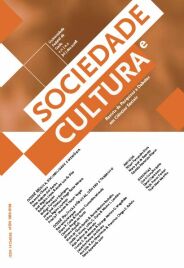A esquizoanálise: um olhar oblíquo sobre corpos, gêneros e sexualidades
DOI:
https://doi.org/10.5216/sec.v11i2.5293Keywords:
esquizoanálise, corpo, gênero, sexualidadeAbstract
O trabalho apresenta alguns conceitos da esquizoanálise, teoria produzida por Gilles Deleuze e Félix Guattari, para analisar algumas das cartografias contemporâneas sobre as novas estéticas do corpo, de gênero e da sexualidade. O projeto esquizoanalítico apresenta o desafio da desconstrução dos modelos monolíticos da subjetividade para uma produção de novas estéticas da subjetividade e novas semióticas, que reinventem novas relações com os outros e com nós mesmos, na composição de novos territórios existenciais. O desafio de uma experimentação que leve em conta não identidades, mas devires, não retrospectros do passado, mas o próprio presente, ensaiando novas formas de subjetividade, novas estéticas da existência.Downloads
Download data is not yet available.
Downloads
Published
2008-12-19
How to Cite
DINIS, Nilson Fernandes. A esquizoanálise: um olhar oblíquo sobre corpos, gêneros e sexualidades. Sociedade e Cultura, Goiânia, v. 11, n. 2, 2008. DOI: 10.5216/sec.v11i2.5293. Disponível em: https://revistas.ufg.br/fcs/article/view/5293. Acesso em: 17 feb. 2026.
Issue
Section
Free Articles
License
Authors who publish in this journal agree to the following terms:
- Authors retain the copyright and grant the journal the right of first publication, the work being simultaneously licensed under the Creative Commons Attribution License, which allows the sharing of the work with acknowledgment of authorship and of the initial publication in this journal;
- Authors are authorized to enter into additional contracts separately, for non-exclusive distribution of the version of the work published in this journal (eg, publishing in an institutional repository or as a book chapter), with acknowledgment of authorship and of the initial publication in this journal;
- Authors are allowed and encouraged to post and distribute their work online (eg, in institutional repositories or on their personal page) at any point before or during the editorial process, as this can bring productive change as well as increases the impact and the citation of the published work (see O Efeito do Acesso Livre).



